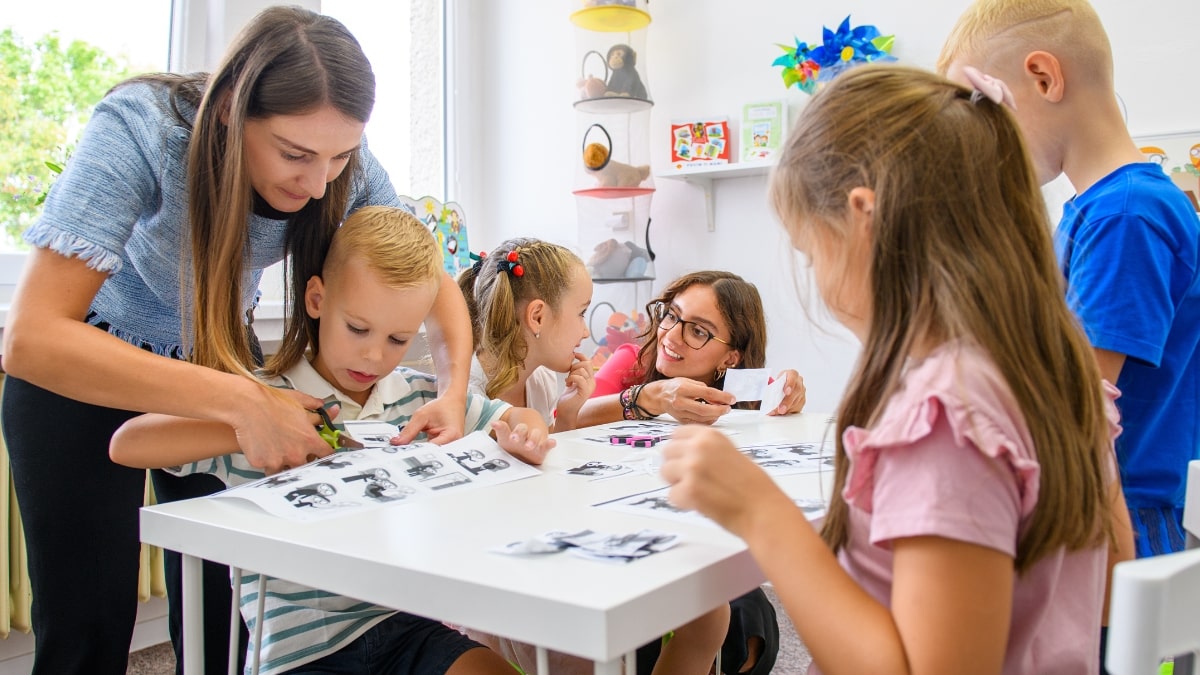Autism is a developmental condition where a child finds it hard to talk, understand others and likes to do the same things again and again. The children with autism often find it difficult to communicate and connect with other people around them. In short, children with autism may struggle to connect socially which can affect how they interact with the world around them.
That’s where the social skills come into the picture, these are important skills for children to express themselves, make friends and feel happy in their everyday life. Although it can be challenging for children with autism but there are many ways to help them improve these skills easily which we will discuss in this blog below.
Understanding Social Skills and Their Importance
The social skills refer to how the children interact with people around them. This includes speaking, listening, sharing thoughts/feelings and understanding the emotions of other people. These skills also help the children to build better relationships with others. If a child with autism develops these skills so it supports their emotional well-being and independence. When the children know how they should behave around others so they can avoid misunderstandings and feel more comfortable in different settings like school, home etc.
Start with Simple Communication
Most children with autism find it difficult to speak clearly or understand what is being said. That is why the parents or educators should teach simple words or use signs that can help a child to say what they want. As early communication skills are the foundation for better social skills in future, the parents and teachers should use easy words, repeat them again and again and praise the child when they try to speak those words. Moreover, using pictures can also help the children to understand and express themselves better.
Learning to Notice Social Signs and Body Language
Some social signs like eye contact, smiling and voice tone show how someone feels and children with autism may not see these signs easily. So, learning to notice if someone is happy, sad or angry helps the children know how to react. The parents can teach their children to watch these signs to understand the emotions of others.
They can help them understand that a smile usually means someone is happy and a loud voice might mean the person is upset. If the children know these signs, then they can respond kindly to people around them and make new friends as well.
Playing to Learn Social Interaction
We all know that playing is a good way for children to learn sharing, waiting for turns and working with others. That is why the games led by adults or therapists can help the children with autism to join group plays and autism summer camps with other kids to learn social interaction in a better way. Also, playing with other kids helps the children to become more creative and talk more.
The Role of Family Support
The parents and family members play a very important role in teaching social skills to the children. Even the simplest things done at home like reading stories, talking about the day and meeting relatives can help the children with autism to adapt these skills. Some families may already have daily routines like eating together or celebrating festivals which makes it easy for the children to learn social skills. Similar activities help the children to learn how to talk and behave well with others. When children feel loved and supported at home, they get brave and excited enough to meet new people and try new social things.
Maintaining Routine and Predictability
One thing about children with autism is that they feel safe when their daily routine is the same every day. If a child knows what will happen during the playtime so they will feel less scared and ready to join the other kids. Like, having playdates or group time at the same time regularly helps the children to prepare for it. Also, showing pictures or charts of their daily activities helps the children to follow their routine and a good routine also helps the child to do things on their own.
Using Social Stories to Teach Behaviour
The social stories are basically short stories that help the children understand what they should do in the different social places. These stories help the children to understand how to act when they visit a friend’s home or in the classroom. Moreover, reading these stories helps the children get ready for social events. That is because these short stories use simpler words which are very easy to understand and pictures as well so that the children can understand them without facing any difficulties.
Group Activities to Practice Social Skills
Some group activities with the help of adults can help the children to become more confident as they will be talking and listening to others. These social group activities mainly include drawing, games and story time. Also, being with other children teaches the children with autism to learn the important social skills like waiting, sharing etc and it also helps them to feel less lonely.
Alternative Ways to Communicate
The children with autism may not always use the proper words. Some of them find it easy to show what they want by using pictures, signs or hand movements. These other ways of talking help children say what they feel without getting upset. So, the parents and therapists can work together to choose the best way for the child to help them communicate. That is because when the children have a way to express themselves so they can feel more understood and connected with other people.
Teaching Emotional Awareness
They may also not understand how the other person is feeling so teaching children about their feelings can help them behave better with others. To help them become more emotionally intelligent, the parents and teachers can use cards with different faces, act out emotions or talk about feelings in stories. Once the children learn about feelings so they can also learn to control their own emotions slowly. They will understand when someone is upset or when a friend needs comfort and this also helps the children to make new friends.
Conclusion
Children with autism can also learn social skills through simple communication, daily routines, group activities and emotional understanding. However, these skills take time, patience and regular support but they can learn these skills over time. When the children feel safe and encouraged so they can learn to connect better with others.
If your child needs extra help so the Mind Grove Therapy offers expert guidance and personalised support. Our caring team works closely with parents and families to help their children learn the essential social skills over time. You can contact us through the available details on our website for more details!


